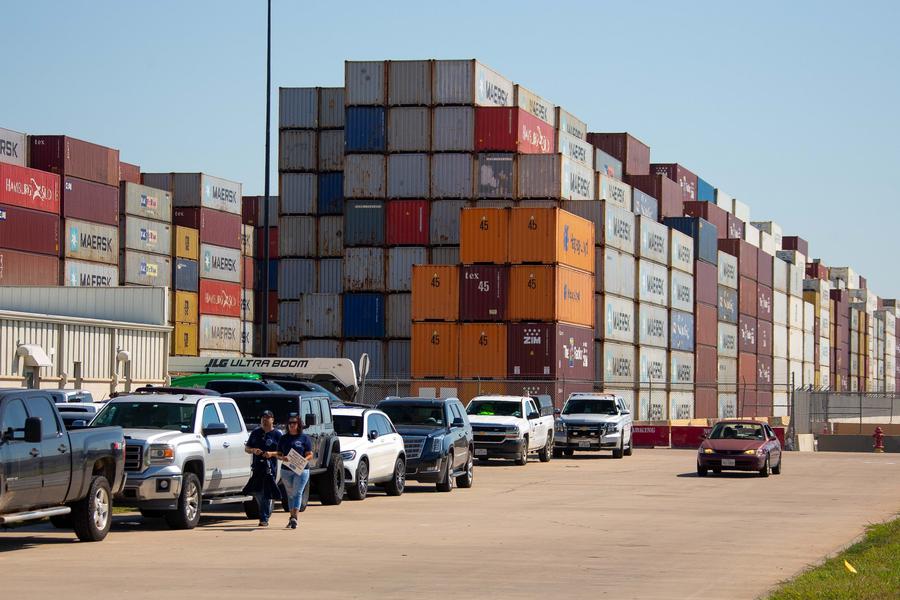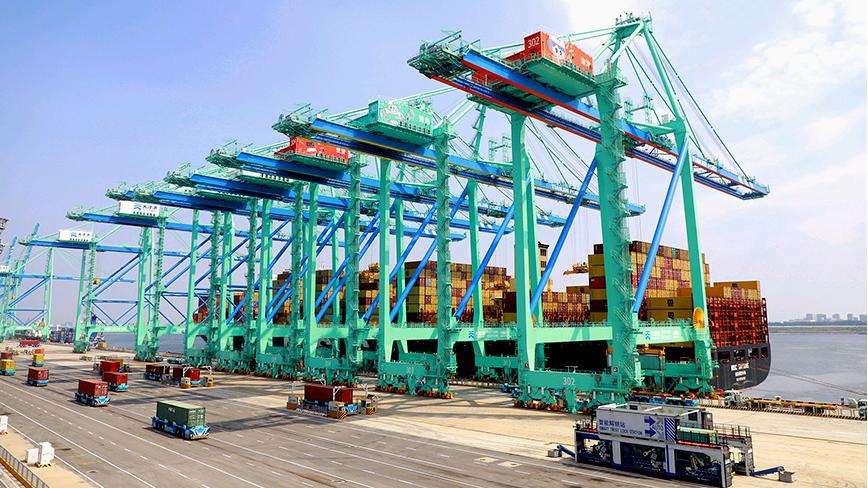Can U.S. striking port workers win battle against automation?

Port workers participate in a strike at the Port Houston in Texas, the United States, on Oct. 1, 2024. (Photo by Chengyue Lao/Xinhua)
While automation is advancing with unstoppable force, the fight against robots replacing human workers will help shape our future in an AI-driven world, with serious consequences for global peace in the rest of the 21st century.
HOUSTON, Oct. 3 (Xinhua) -- Picket lines were formed on Tuesday as about 45,000 dock workers walked out at 36 ports along the U.S. East and Gulf Coasts, demanding higher pay and ban on automation amid fears of job loss in an AI-driven future that extends far beyond the dock industry globally.
SHARP DISAGREEMENT
At Port Houston, striking workers, organized by the International Longshoremen's Association (ILA), erected a large banner on Tuesday that read, "No to automation! Machines don't have families to feed."
"We are prepared to fight as long as necessary, to stay out on strike for whatever period of time it takes, to get the wages and protections against automation our ILA members deserve," said Harold Daggett, the ILA president.
On the eve of the walkout, the United States Maritime Alliance (USMX), which represents the ports, had increased its offer on Monday, promising to raise wages by nearly 50 percent while keeping the limits on automation in place from the old contract and allowing semi-automation.
The union rejected the offer Tuesday, saying it fell short of workers' demand.
The disagreement remains sharp as the labor union not only demands a 77 percent wage raise over the six-year life of the contract, but also a "total ban on automation" at ports, multiple U.S. media outlets reported.
As always, port operators, often representing large corporations, are keen to cut costs, increase profits, improve efficiency, and reduce the risk of accidents by adopting new technologies. Supporters of automation view it as a "must" and an inevitable step toward achieving these goals.
If the union gets most of what it wants from their employers regarding automation, U.S. ports will continue to lag behind international ones in terms of speed and efficiency, the Competitive Enterprise Institute, a right-wing think tank, warned on Tuesday.
The labor union, focused on protecting workers' rights, argues that corporations are dead set on replacing hard-working people with automation but "robots do not pay taxes and they do not spend money in their communities."
"USMX is trying to fool you with promises of workforce protections for semi-automation. Let me be clear: we don't want any form of semi-automation or full automation," ILA leadership said in a September letter to members.

Port workers participate in a strike at the Port Houston in Texas, the United States, on Oct. 1, 2024. (Photo by Chengyue Lao/Xinhua)
WHO CAN LAUGH AT LAST
Can union workers win the battle against automation?
In the coming weeks, port operators may raise their offer again as disruptions to the U.S. economy grow, the presidential election approaches, and the pressure to reach an agreement accumulates day by day.
The ports affected by the strike handle roughly half the country's cargo ships. Analysis firm J.P. Morgan estimates the port work stoppage could cost the U.S. economy 5 billion U.S. dollars per day, not to mention fears of inflation and supply shortages. This strike could potentially become one of the most disruptive labor actions to the U.S. economy in decades.
The ILA last launched a major strike in 1977 against big containers, which were much easier to handle than individual boxes, saving costs and reducing the need for as many workers. The strike lasted 44 days and ended with a substantial pay raise and guaranteed income for union members, according to The Washington Post.
However, the 1977 strike did nothing to stop containers from dominating the shipping industry, which finds itself in a similar episode during the current strike: workers fighting to stop another technological advancement: automation.
Looking back at history, it is difficult to find an optimistic example of such resistance that has successfully preserved jobs as wished by the striking workers. One of the most famous early examples is the Luddite movement in 19th-century Britain, where textile workers protested automation by destroying machines but were eventually suppressed by the government.
It seems most likely that new industries and jobs will emerge from technological innovations, but only for those who acquire the necessary skills to thrive in the modern workforce. But what will happen to those who lose their jobs?
Industry experts suggest that the AI revolution and increased use of robots could drastically reduce the number of workers needed on-site at dockyards. Tasks like operating cranes, trucks, and gates will require fewer workers, possibly almost none.
American dock workers have already felt the impact of automation. A report from the Economic Roundtable found that automation removed 572 full-time-equivalent jobs per year at the Port of Long Beach and the Port of Los Angeles in 2020 and 2021.

Port workers participate in a strike at the Port of Houston in Texas, the United States, on Oct. 1, 2024. (Photo by Chengyue Lao/Xinhua)
"AUTOMATION UNEMPLOYMENT"
Beyond the shipping industry, automation is expected to eliminate millions of jobs in sectors such as transportation, retail, healthcare, law, finance, and many other professions, according to researcher Harry Holzer, writing for the Brookings Institution.
Local observers note that the labor market is becoming increasingly polarized. "Automation unemployment" is now a global challenge, affecting not only individual livelihoods but also social stability and economic growth.
"Global labor income share -- the proportion of total global income that goes to workers -- is shrinking," said Celeste Drake, deputy director-general of the UN International Labour Organization (ILO), last month.
"The global trend of shrinking pay in heavily industrialized economies could be driven -- at least temporarily -- by tech innovations like automation and AI in the workplace," warned the ILO official. "This needs to change because it's increasing inequality, which disproportionately affects working people."
One thing is certain: this strike will not be the last effort to resist automation. While automation is advancing with unstoppable force, the fight against robots replacing human workers will help shape our future in an AI-driven world, with serious consequences for global peace in the rest of the 21st century.
Photos
Related Stories
- China, U.S. commerce ministers to hold call in near future
- China, U.S. health departments agree to strengthen institutional dialogue
- U.S. facing pressing challenges in meeting climate goals: report
- New York mayor faces bribery, fraud charges
- NYC mayor indicted by federal prosecutors: reports
- U.S. Congress passes short-term funding bill to avert gov't shutdown before election
Copyright © 2024 People's Daily Online. All Rights Reserved.









